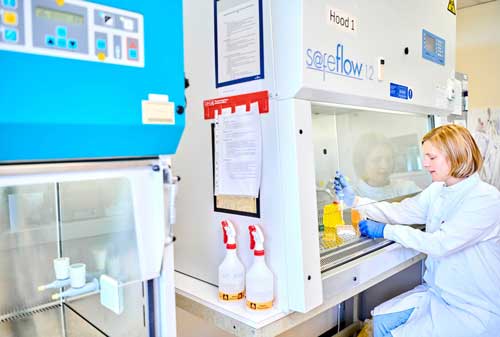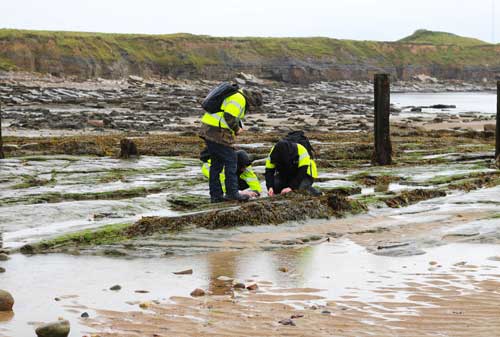Occupations
With so much choice, deciding which kind of job you want can be difficult. Use our occupations information to become more confident about exploring your options.
Search occupations
0 results
Animal care and veterinary
Find out about careers with animals, including roles such as animal behaviourist, zoologist, and vet. Access information on finding experience and graduate opportunities.

Actuarial, insurance and pensions
Find out more about careers in this sector, including roles such as actuary, insurance broker and loss adjustor. Access information about how to gain experience and secure graduate opportunities.

Advertising
Explore careers in advertising, including roles such as account executive, creative director, and advertising copywriter. Read information about how to gain experience, find graduate opportunities or work freelance.

Agriculture
Find out about careers in agriculture and forestry, including roles such as in national parks, woodland and farm management, conservation, and rural consultant. Access information on finding experience and graduate jobs.

Applying to the Fast Stream
Find out about the application and assessment for the Fast Stream, the Civil Service accelerated leadership development programme. Read about their summer internship programme and how to pass their selection process.

Architecture, planning and landscape
Find out about careers in architecture, planning and landscape. Including roles such as architect, town planner and urban designer. Access information about work experience, graduate opportunities or working for yourself.

Armed forces
Find out about careers in the armed forces, including the Army, the Royal Navy (including the Marines) and the RAF. Access information about gaining experience, UOTC and securing graduate opportunities.

Banking and finance
Explore careers in banking and finance, including roles such as investment banker, financial adviser or stockbroker. Access information about how to gain experience, find graduate opportunities or work for yourself.

Charities and voluntary organisations
Find out more about careers in this sector, including roles such as charity fundraiser, volunteer coordinator and advice worker. Access information about how to gain experience and secure graduate opportunities.

Civil engineering, geomatics and construction
Find out about careers in this sector, including working as a civil or building engineer or in GIS or GPS. Access information about gaining experience and securing graduate opportunities.

Community, advice and guidance
Explore careers in community, advice and guidance, including roles such as youth worker, community art worker, housing officer and careers adviser. Read information about how to secure experience and graduate opportunities.

Complementary therapies
Find out about careers in this sector, including roles such as a sports therapist, chiropractor, or acupuncturist. Access information about finding experience and opportunities, including working for yourself.

Corporate social responsibility (CSR)
Find out more about careers in this sector, including roles such as CSR manager, sustainability consultant and compliance officer. Access information about how to gain experience, secure graduate jobs or work for yourself.

Counselling and psychotherapy
Explore careers in counselling and psychotherapy, including roles such as high intensity therapist, counsellor, psychotherapist, or cognitive behaviour therapist. Read about how to gain experience and find graduate jobs.

Creative arts, design and fashion
Explore careers in art, design and fashion, including roles such as arts administrator, fine artist, fashion designer and photographer. Read about how to gain experience, find graduate opportunities and work freelance.

Border Force and immigration
Explore careers in the Border Force and immigration, including roles such as Border Force Officer and Immigration Officer. Access information about how to gain experience, find graduate opportunities or work for yourself.

Development
Explore careers in development and international aid, including working for government and non-governmental agencies, charities, pressure groups and think tanks. Access information about finding experience and opportunities.

Economics and statistics
Find out about careers in this sector, including roles such as economist, statistician, and various roles in risk. Access information about how to gain experience and secure graduate opportunities.

Education alternatives
Find out more about careers in this sector, including roles such as tutor, teaching assistant, youth worker and careers adviser. Access information about how to gain experience and secure graduate opportunities.

Energy and utilities
Find out about careers in renewable energy, nuclear, oil and gas and utilities. Including roles such as drilling engineer, energy manager or geoscientist. Access information about work experience and graduate opportunities.

Engineering
Find out about careers in this sector, including roles such as mechanical engineer, chemical engineer or electrical engineer. Access information about how to gain experience and secure graduate opportunities.

Environment and sustainability
Find out about environmental roles, such as ecology, ranger, management, conservation, energy manager, water quality or waste. Access information on finding experience and graduate opportunities.

Event management and hospitality
Find out about careers in events, hospitality and catering, including roles such as events, restaurant or hotel manager. Access information about how to gain experience, secure graduate opportunities or work for yourself.

Food science
Find out about food science careers, including roles such as nutritionist, food technologist, product scientist and quality manager. Access information about how to gain experience, secure graduate jobs or work for yourself.

Government, politics and public affairs
Explore careers in this sector, including working in central and local government, security and intelligence services, trade unions, politics, and public affairs. Access information about finding experience and opportunities.

Healthcare
Find out about careers in healthcare, including working as a doctor, dentist, pharmacist, dental hygienist, dietitian, speech therapist and health professional. Access information on finding experience and opportunities.

HR, recruitment and training
Find out about careers in human resources and recruitment, including roles such as HR adviser, recruitment consultant and training officer. Access information about gaining experience and securing graduate opportunities.

Journalism and writing
Find out about careers in this sector, including roles such as newspaper journalist, magazine journalist or writer. Access information about how to gain experience, secure graduate opportunities or work for yourself.

Language careers
Find out careers in languages, including roles such as teaching, translator, or interpreter. Access information about gaining experience, securing graduate opportunities, and working freelance.

Law
Find out about careers in this sector, including roles such as barrister, solicitor, paralegal and legal secretary. Access information about conversion, the SQE, gaining experience and securing graduate opportunities.

Accountancy and tax
Find out more about careers in this sector, including roles such as auditor, tax adviser and chartered accountant. Access information about how to gain experience and graduate opportunities.

Libraries and information management
Find out about careers in this sector, including roles such as a librarian or archivist. Access information about gaining experience and securing graduate opportunities, including in a library.

Life science
Find out about careers in life science, including lab based roles such as research scientist, microbiologist, pharmacologist or forensic scientist. Access information about how to gain experience and secure graduate jobs.

Logistics, supply chain management and transport
Find out about careers in this sector, including roles such as logistics, supply chain or operations manager, pilot or transport planner. Access information about finding experience and opportunities or working for yourself.

Management consultancy
Explore careers in consultancy, including roles such as management consultant or business development manager. Access information about how to gain experience, find graduate opportunities or work for yourself.

Marine science
Find out about careers in marine science, including roles such as marine biologist, marine scientist, and oceanographer. Access information on finding experience and graduate opportunities.

Marketing and market research
Find out about careers in marketing, including roles such as digital marketer, social media manager or SEO specialist. Access information about gaining experience, securing graduate opportunities, and working freelance.

Media
Find about careers in film, television, and radio, including roles such as runner, camera operator, technician, director or producer. Access information about finding experience and opportunities and working freelance.

Museums, galleries and archaeology
Explore careers in museums, galleries, and archaeology, including roles such as archivist, curator, archaeologist, and museum education officer. Read about how to gain experience, find graduate opportunities or work freelance

Music and performing arts
Explore careers in music and performing arts, including roles such as musician, actor, music producer, theatre director and promotions manager. Read advice on gaining experience, finding graduate jobs and freelancing.

Patent work
Find out about careers in patents, including working as a patent or trademark attorney or in intellectual property (IP). You don't need a law degree; instead a science degree is strongly preferred.

Physical science
There's an extensive range of careers in physical sciences. From astronomy to materials, meteorology and analytical chemistry.

Police and emergency services
Explore careers in the emergency services, including roles such as police officer, detective, firefighter or paramedic. Access information about how to gain experience, find graduate opportunities or work for yourself.

Prisons and probation
Find out about careers in prisons and probation, including roles such as prison officer, youth offending team officer or probation officer. Access information about how to gain experience and secure graduate opportunities.

Project management
Find out about careers in this sector, including roles such as project manager and project co-ordinator. Access information about how to gain experience, secure graduate opportunities or work for yourself.

Property and surveying
Find out about careers in this sector, including roles such as estate agent, building surveyor or quantity surveyor. Access information about gaining experience and secure graduate opportunities.

Psychology
Explore careers in psychology, including roles such as clinical, sports, educational, or forensic psychologist, and psychological practitioner positions. Read about how to gain experience and find graduate opportunities.

Public health
Find out about careers in public, environmental, occupational, and global health, including roles such as an epidemiologist. Access information on finding work experience and graduate opportunities.

Public relations
Find out about physical science careers, including roles analytical chemist, geoscientist, materials specialist, astronomer or physicist. Access information about how to gain experience and secure graduate jobs.

Publishing
Explore careers in publishing, including roles such as editorial assistant, copy editor or literary agent. Access information about how to gain experience, find graduate opportunities or work for yourself.

Research in academia
Find out more about careers in academic research, including roles such as research assistant and higher education lecturer. Read information about how to gain experience, find graduate opportunities, or work freelance.

Retail, buying and selling
Find out about careers in retail and buying, including roles such as retail, sales or procurement manager, visual merchandiser, or buyer. Access information about finding experience and opportunities or working for yourself.

Science careers outside the lab
Opportunities out of the lab exist in the public, private and voluntary sectors - including business, research, policy and teaching. Explore careers in communication, regulatory affairs, technical writing, and medical sales.

Social research and policy work
Explore careers in social research and policy, including roles such as social researcher, policy officer or government social research officer. Read about how to gain experience and find graduate opportunities.

Social work
Find out more about careers in social work, including information on social worker and social work assistant roles. Read about how to gain experience and secure graduate opportunities.

Sports Science
Find out about careers in this sector, including roles such as sports and exercise therapist, physiologist, personal trainer, and sports development officer. Access information on finding experience and graduate jobs.

Teaching English as a foreign language
Teaching as a foreign language (TEFL) is a popular option for graduates wishing to spend time living and working abroad. Find out more about roles in the sector such as English as a foreign language teacher (EFL).

Teaching in FE and HE
Find out about careers in this sector including roles such as further education teacher and higher education lecturer. Access information about how to gain experience and secure graduate opportunities.

Teaching in schools
Teaching in schools can be a rewarding and fulfilling career. There are many opportunities for career progression. Find out about roles such as early years teacher, primary school teacher and secondary teacher.

Technology and data
Find out about technology and data careers, including roles such as IT consultant, cyber security analyst, data scientist, UX designer, games developer. Access information about finding work experience and graduate jobs.

Leisure, sport and tourism
Explore careers in leisure, sports and tourism, including roles such as personal trainer, tourism officer, sports therapist, and sports development officer. Read about how to gain experience and find graduate opportunities.

